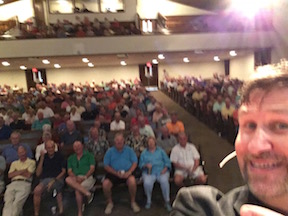A Conversation with the Country’s Biggest Civil War Roundtable (part one)

(part one of a six-part series)
It’s the Tuesday after Memorial Day weekend, and summer in southeastern North Carolina feels like it’s already in full swing. As members of the Brunswick Civil War Roundtable file into Hatch Auditorium, the temperature stands at a friendly 95 degrees, but the ocean air is keeping the humidity at bay for the people standing in line, waiting to get in.
It’s not the roundtable’s regular meeting night. The venue had a conflict arise for the regular June date, which necessitated a move to this last week in May instead. Between the switch and being nestled up against the long holiday weekend, roundtable President Mike Powell worries about attendance. “After your last performance here, I’m sure we’d have had a record night tonight,” he tells me. But the weather, he says, ruefully. The rescheduling.
As more roundtable members arrive, they fill the grassy parking lot outside then stroll over to take their place in line. When the line stretch beyond the protection of the building’s shade, volunteers take water outside to keep people refreshed as they wait. Inside, other volunteers help check people in, offer more refreshments, and trade conversation like Old Home Week. The line moves efficiently with six computerized check-in points.
Hatch Auditorium, owned by the North Carolina Baptist Assembly, sits at the far tip of Oak Island, in the middle of what used to be a Civil War fort—Fort Caswell—later converted into a WWII radar station. The Baptists later bought it and converted the property into a large summer retreat center. A booth with a friendly gatekeeper controls the traffic coming in and out.
The auditorium itself feels like a cross between a rustic chapel and a Boy Scout assembly hall. Arching wooden beams hold up a wide, peaked ceiling. A balcony on the back wall surrounds a high-tech soundbooth. In the front of the room, a fixed podium stands front-and-center on a raised stage. Overhead, movie screens display PowerPoint slides of upcoming events, roundtable news, and messages from partner organizations like nearby Fort Fisher and the North Carolina Maritime Museum. A sutler sets up his used book sale in front of the stage, and a table awaits me for my own books.
No sooner do I have them set up, though, than the Round Table’s former president, Wally Rueckel, whisks me up one aisle of the auditorium and down the other, introducing me to roundtable members he knows. The assembling crowd is big and getting bigger, so he doesn’t know everyone, but I’m impressed that he knows as many as he does. I shake hands, tell people how glad I am to be there—and I honestly am—and I thank folks for coming out to hear me. “Wouldn’t miss it,” they say. Or “Glad to be here.” Or “Looking forward to it.” It’s a friendly crowd.
In the end, 411 members of the roundtable turn out for my talk—a third of the group’s overall membership. “I am absolutely convinced that we would have broken the 500 mark had it not been for the holiday and the fact that we had to move the meeting up a week,” Mike apologizes to me later.
I laugh. “Four hundred and eleven is nothing to shake a stick at,” I assure him. What Mike considers an “off” night is still a larger group than most Civil War historians ever get to talk to at once.
At a time when many roundtables are struggling with membership—and when, just months earlier, one of North Carolina’s eleven roundtables actually disbanded—the Brunswick Civil War Roundtable is absolutely booming. There’s no other way to describe it: Business in Brunswick is booming.
So, the day after my talk, I invite Mike to join me for a cup of coffee on the porch of the Robert Ruark Inn in Southport—the B&B where the roundtable put me up—so we can talk about the roundtable’s success. What makes it tick? What can other roundtables learn from them? And how do they make it all seem like so much fun?
A retired IRS agent, Mike is a man with an ebullient personality and plenty of good humor who’s quick to laugh and glad to talk history. He settles into one of the rocking chairs, balancing his paper coffee cup on one of the arms. “We’ve had a lot of luck,” he tells me. “Believe me. We’ve had a lot of luck.”
But, as I discover, there’s a lot of intentional effort involved, too, and a careful shepherding of resources. Over the course of nearly an hour, Mike and I have an enlightening conversation—which I’ll share with ECW readers over the next few days.
Wow! This is wonderful news! It is so important that we do not forget the lessons learned during the War. Congratulations on the attendance! I will be very interested in reading your updates.
Please tune in for each of the next five days for the rest of the series!
Yes, good news. It will be interesting to read how they put things together so successfully in Brunswick.
As Mike will say, it’s all built on an active volunteer base. Volunteer relations can be a time-intensive, tricky business–but as BCWRT demonstrates, it can pay off huge dividends.
curious to know avg. age group. Not really seeing much in the younger people at our meetings .
He’ll talk about that in an upcoming segment. You are not alone, my friend.